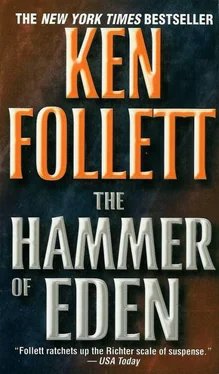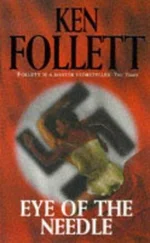Like most agents, she had never fired her gun except in training.
FBI agents were investigators. They were highly educated and well paid. They did not dress for combat. It was perfectly normal to go through an entire twenty-five-year career with the Bureau and never get involved in a shoot-out or even a fistfight. But they had to be ready for it.
Judy put her weapon into a shoulder bag. She was wearing the ao dai , a traditional Vietnamese garment like a long blouse, with a little upright collar and side slits, always worn over baggy pants. It was her favorite casual wear because it was so comfortable, but she knew it also looked good on her: the white material showed off her shoulder-length black hair and honey-colored skin, and the close-fitting blouse flattered her petite figure. She would not normally wear it to the office, but it was late in the evening, and anyway she had resigned.
She went outside. Her Chevrolet Monte Carlo was parked at the curb. It was an FBI car, and she would not be sorry to lose it. When she was a defense lawyer she could get something more exciting — a little European sports car, maybe, a Porsche or an MG.
Her father’s house was in the Richmond neighborhood. It was not very swanky, but an honest cop never got rich. Judy took the Geary Expressway downtown. Rush hour was over and traffic was light, so she was at the Federal Building in a few minutes. She parked in the underground garage and took the elevator to the twelfth floor.
Now that she was leaving the Bureau, the office took on a cozy familiarity that made her feel nostalgic. The gray carpet, the neatly numbered rooms, the desks and files and computers, all spoke of a powerful, well-resourced organization, confident and dedicated. There were a few people working late. She entered the office of the Asian Organized Crime squad. The room was empty. She turned on the lights, sat at her desk, and booted up her computer.
When she thought about writing her résumé, her mind went blank.
There was not much to say about her life before the FBI: just school and two dull years in the legal department of Mutual American Insurance. She needed to give a clear account of her ten years in the Bureau, showing how she had succeeded and progressed. But instead of an ordered narrative, her memory produced a disjointed series of flashbacks: the serial rapist who had thanked her, from the dock, for putting him in jail where he could do no more harm; a company called Holy Bible Investments that had robbed dozens of elderly widows of their savings; the time she had found herself alone in a room with an armed man who had kidnapped two small children, and she had persuaded him to give her his gun …
She could hardly tell Brooks Fielding about those moments. They wanted Perry Mason, not Wyatt Earp.
She decided to write her formal letter of resignation first.
She put the date, then typed: “To the Acting Special Agent in Charge.”
She wrote: “Dear Brian: This is to confirm my resignation.”
It hurt.
She had given ten years of her life to the FBI. Other women had got married and had children, or started their own business, or written a novel, or sailed around the world. She had dedicated herself to being a terrific agent. Now she was throwing it all away. The thought brought tears to her eyes. What kind of an idiot am I, sitting alone in my office crying to my damn computer?
Then Simon Sparrow came in.
He was a heavily muscled man with neat short hair and a mustache. He was a year or two older than Judy. Like her, he was dressed casually, in tan chinos and a short-sleeved sports shirt. He had a doctorate in linguistics and had spent five years with the Behavioral Science Unit at the FBI Academy at Quantico, Virginia. His specialty was threat analysis.
He liked Judy and she liked him. With the men in the office he talked men’s talk, football and guns and cars, but when he was alone with Judy he noticed and commented on her outfits and her jewelry the way a girlfriend would.
He had a file in his hand. “Your earthquake threat is fascinating,” he said, his eyes glowing with enthusiasm.
She blew her nose. He had surely seen that she was upset, but he was tactfully pretending not to notice.
He went on: “I was going to leave this on your desk, but I’m glad I’ve caught you.”
He had obviously been working late to finish his report, and Judy did not want to deflate his keenness by telling him she was quitting. “Take a seat,” she said, composing herself.
“Congratulations on winning your case today!”
“Thanks.”
“You must be so pleased.”
“I should be. But I had a fight with Brian Kincaid right afterward.”
“Oh, him.” Simon dismissed their boss with a flap of his hand. “If you apologize nicely, he’ll have to forgive you. He can’t afford to lose you, you’re too good.”
That was unexpected. Simon was normally more sympathetic. It was almost as if he had known beforehand. But if he knew about the fight, he knew she had resigned. So why had he brought her the report?
Intrigued, she said: “Tell me about your analysis of the threat.”
“It had me mystified for a while.” He handed her a printout of the message as it had originally appeared on the Internet bulletin board. “Quantico were puzzled, too,” he added. He would have automatically consulted the Behavioral Science Unit on this, Judy knew.
She had seen the message before: it was in the file Matt Peters had handed her earlier today. She studied it again.
MAY 1ST
TO THE STATE GOVERNOR
Hi!
You say you care about pollution and the environment, but you never do nothing about it; so we’re going to make you.
The consumer society is poisoning the planet because you are too greedy, and you got to stop now!
We are the Hammer of Eden, the radical offshoot of the Green California Campaign.
We are telling you to announce an immediate freeze on building power plants. No new plants. Period. Or else!
Or else what, you say?
Or else we will cause an earthquake exactly four weeks from today.
Be warned! We really mean it!
— The Hammer of Eden
It did not tell her much, but she knew that Simon would mine every word and comma for meaning.
“What do you make of it?” he asked.
She thought for a minute. “I see a nerdy young student with greasy hair, wearing a washed-out Guns n’ Roses T-shirt, sitting at his computer fantasizing about making the world obey him, instead of ignoring him the way it always has.”
“Well, that’s about as wrong as could be,” Simon said with a smile. “He’s an uneducated low-income man in his forties.”
Judy shook her head in amazement. She was always astonished by the way Simon drew conclusions from evidence she could not even see. “How do you know?”
“The vocabulary and sentence structure. Look at the salutation. Affluent people don’t start a letter with ‘Hi,’ they put ‘Dear Sir.’ And college graduates generally avoid double negatives such as ‘you never do nothing.’ ”
Judy nodded. “So you’re looking for Joe Bluecollar, aged forty-five. That sounds pretty straightforward. What puzzled you?”
“Contradictory indications. Other elements in the message suggest a young middle-class woman. The spelling is perfect. There’s a semicolon in the first sentence, which indicates some education. And the number of exclamation points suggests a female — sorry, Judy, but it’s the truth.”
“How do you know she’s young?”
“Older writers are more likely to use initial capital letters for a phrase such as ‘state governor’ and hyphenate words such as ‘offshoot’ that young writers run together to make one word. Also, the use of a computer and the Internet suggest someone both young and educated.”
Читать дальше












